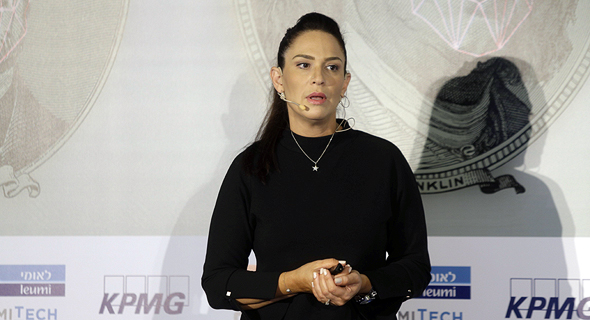WeTech Berlin
Zooming Out on Global Tech Trends
Yifat Oron, the CEO of LeumiTech and chairwoman of Bank Leumi's Innovation Committee highlights the latest tech trends
When assessing the trends in tech and tech investing, one may look at the following trends that are believed to be affecting the way we look at companies and how investments are going to be made.
 Yifat Oron. Photo: Amit Sha'al
Yifat Oron. Photo: Amit Sha'al
Unit Economics Is Back
After a long decade where investors' interest lied mainly in companies that were able to demonstrate accelerated growth, we are seeing a change in flavor. Accelerated growth, or more accurately “growth at all costs,” is no longer Bon Ton. In the last few months, given negative sentiment among capital markets to companies that can’t exhibit a road map to profitability, investors are taking a very different approach to judging investments. They are now taking a close look into unit economics. The most basic “capsule” of a company’s service or product must exhibit significant gross margins, LTV to CAC that make sense, and business model fundamentals that allow the company to reach profitability in the near or mid-term future. Companies with business models that do not comply with this “math” find it much tougher to raise money from venture capital or growth funds.
Investors’ Scrutiny
The recent decade has been characterized by an influx of money seeking better returns and finding it in technology (that has been traditionally delivering higher returns than capital markets). The abundance of capital has somewhat changed the market dynamics. It has shifted power from the buy side (funds) choosing their investments, to the entrepreneurs favoring and choosing which funds will be allowed into their companies. Albeit this trend has many positive elements, it has led to somewhat of a relaxation of the governance of the boards of those tech companies. This has allowed various behaviors that have sometimes led to the destruction of value of the underlying tech companies.
Given recent events, investors have retained their scrutiny and are now exhibiting stricter governance and control over how companies choose to invest their money as well as retain back normative corporate cultures.
One Time Sale - OUT; SAAS - IN
It is already a known fact that companies that are able to cater their technology (service or product) in a recurring revenue model, are valued much higher than their peers that sell one time (HW or SW). SAAS companies are valued at 5x-10x their revenues, whereas similar companies that are not SAAS are valued at 1X-3X at best. Such discrepancy of difference in valuation is leading most companies to figure out their way of introducing recurring revenue business models.
Bundling
The holy grail of monetization has moved to the bundling of service and products. Bundling allows companies to elevate their margins as well as monetize less attractive products by linking them to their cash cow products. Companies utilize the bundling model across industries. Apple, for example, is connecting its devices’ sales to its various media and streaming products (news, TV, and music). Amazon is linking its Prime service to its streaming service, and Google is attaching its cloud offering to its leading YouTube advertising machine as a means to compete with AWS.
Open platforms
Companies are no longer settling for one SW offering. Those who own the customers use their access to provide them with more than one service or product, and try to do so via building a platform. Such platforms allow for a stronger hold on customers and increased "stickiness.” Such open platforms are being noticed in the fintech space (e.g.: N26) as well as SW platforms (Salesforce, Monday.com).
ESG – Environmental, Social Governance
ESG refers to “The three central factors in measuring the sustainability and social impact of an investment in a company or a business.” These create a standard of how a company operates. Large investors set their Investment criteria around these elements, requiring to comply with all (e.g. Blackrock on gender equality).
Recruiting of new talent is highly affected by this trend. Millennials have changed their employment flavors from caring for high salaries and nicely designed offices, to caring about their employers’ purpose, reputation, and even specific industries that people would rather avoid working for.
- 2020’s Top Tech Trends According to This Year’s CES Tech Exhibition
- CTech’s Book Review: How to Hit a Tech Industry Home-Run
- AI and Big Data Are the Future of Finance, Says LeumiTech CEO
Deep Tech is Back
After a long period where deep tech companies that required significant investments and took a long time to become profitable were out of flavor, deep tech is back. The hunger for tech that is driving everything from AI, to IoT, to 5G to data centers, has changed investors' appetite and now the dire straits for semiconductors technology is driving investments into those industries. Investment in deep tech has grown two-fold since 2015 and reached $20 billion in 2019.
The scarcity that has resulted from investors shying away from this space has led to elevated investment amounts as well as exceptionally high mergers and acquisitions values (e.g. Intel acquiring Habana Labs for $2 billion).
What's Next?
So where does it all lead to? We don’t know exactly but we are cautiously following how economies and market dynamics are being highly affected by market needs and customer flavors, mingled with mega trends, trade wars, and the Coronavirus outburst; with some industries definitely being hurt (semiconductors supply chain for sure), while some industries benefiting (internet gaming). A definite beneficiary that is aligned with the aforementioned is ZOOM (video and web conferencing), which is currently up by 60% since its IPO in April 2019.
Yifat Oron is the CEO of Leumitech, a subsidiary of Israeli Bank Leumi focused on serving tech companies.



